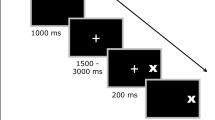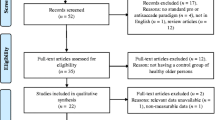Abstract.
Antisaccade performance was investigated in a sample of 2,006 young males as part of a large epidemiological study investigating psychosis proneness. This report summarizes the effects of task parameters on performance using a sample of 55,678 antisaccade trials collected from a subpopulation of 947 individuals. Neither the amplitude nor the latency of an error prosaccade in the antisaccade task was correlated with the latency of the ensuing corrective antisaccade that almost always followed an error. However, the latency of the corrective antisaccade decreased with increasing stimulus distance. Concerning the effects of specific task parameters, trials with stimuli closer to the central fixation point and trials preceded by shorter fixation intervals resulted in more errors and longer latencies for the antisaccades. Finally, there were learning and fatigue effects reflected mainly in the error rate, which was greater at the beginning and at the end of the 5-min task. We used a model to predict whether an error or a correct antisaccade would follow a particular trial. All task parameters were significant predictors of the trial outcome but their power was negligible. However, when modeled alone, response latency of the first movement predicted 40% of errors. In particular, the smaller this latency was, the higher the probability of an error. These findings are discussed in light of current hypotheses on antisaccade production mechanisms involving mainly the superior colliculus.
Similar content being viewed by others
Author information
Authors and Affiliations
Additional information
Electronic Publication
Rights and permissions
About this article
Cite this article
Smyrnis, .N., Evdokimidis, .I., Stefanis, .N. et al. The antisaccade task in a sample of 2,006 young males. Exp Brain Res 147, 53–63 (2002). https://doi.org/10.1007/s00221-002-1207-5
Received:
Accepted:
Issue Date:
DOI: https://doi.org/10.1007/s00221-002-1207-5




